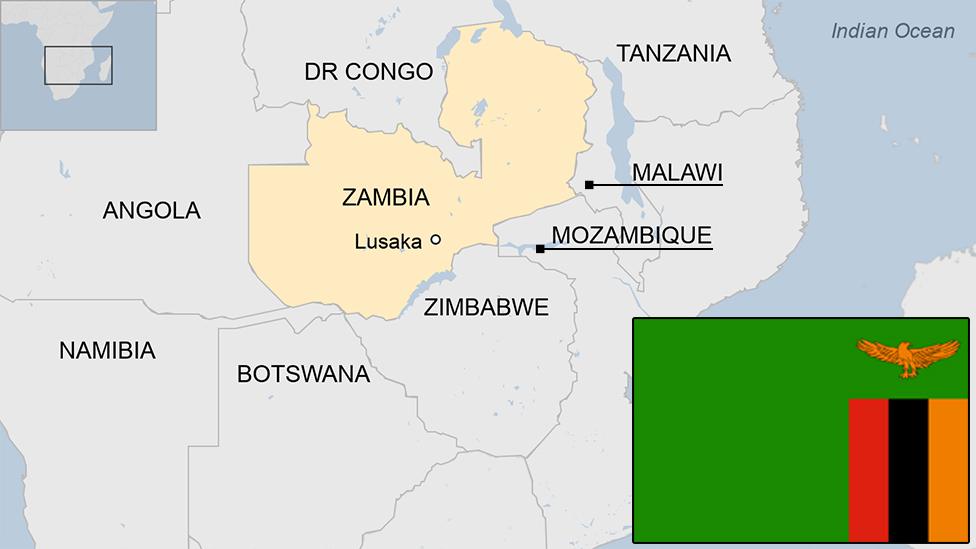Hakainde Hichilema's treason trial puts Zambia at crossroads
- Published
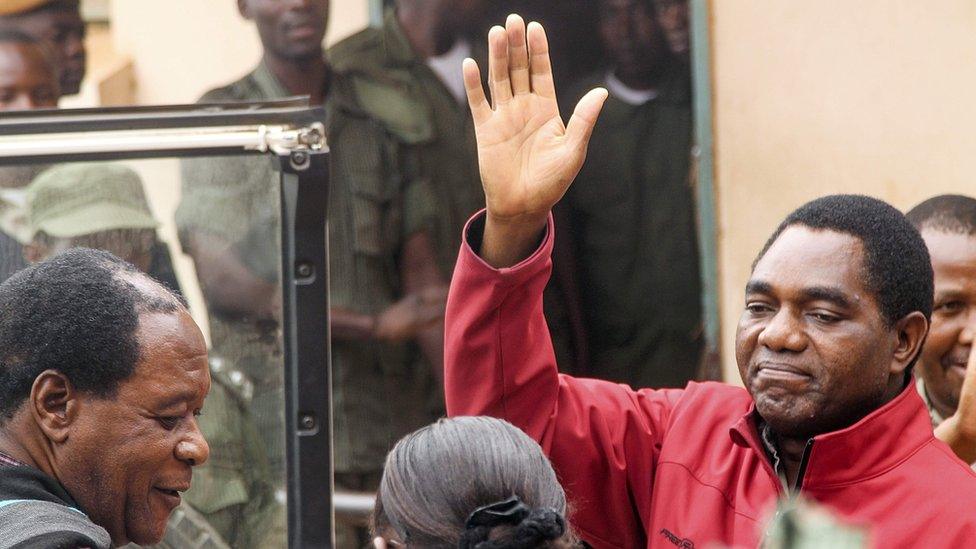
Hakainde Hichilema - the man in the red fleece
Zambian opposition leader Hakainde Hichilema has been in police custody for over a month, facing treason charges after a row over the presidential motorcade. The BBC's Karen Allen asks whether Zambia's reputation as a bastion of democracy is under threat.
The man in the red fleece has been shuttling between prison and court for over a month in a country which rarely makes international headlines.
But Hakainde Hichilema, leader of Zambia's United Party for National Development (UPND) has now become famous as the man facing treason charges for what appears to be a minor traffic offence.
Critics fear it does not bode well for a country considered one of the most stable in Africa.
Mr Hichilema's convoy failed to give way to the president's motorcade as it headed to a function last month. Both the president and the opposition leader had been invited to the traditional ceremony in the country's Western Province.
The scene captured on video shows two parallel convoys, driving at speed, jostling for space. This act allegedly endangered the life of the president and so treason charges followed.
How road rage led to treason charge in Zambia
To many it appears the courts are being used to keep Mr Hichilema away from the political scene. But for how long?
He has lost five presidential races. The last one, back in August 2016, was marred by violence in the run-up to voting day.
President Edgar Lungu's victory received international endorsement so a bruised Mr Hichilema sought relief in the courts.
However his challenge in the Constitutional Court appears to have been blocked. It is now the subject of a separate High Court action.
One Member of Parliament, afraid of giving their name, believes a complicated legal row over how many times President Lungu can stand for office, is what is really behind this.
"He knows he might be challenged in the 2021 election so he is consolidating his position now," the MP told the BBC.
Ironically, the treason charge may have boosted the opposition leader's public profile.
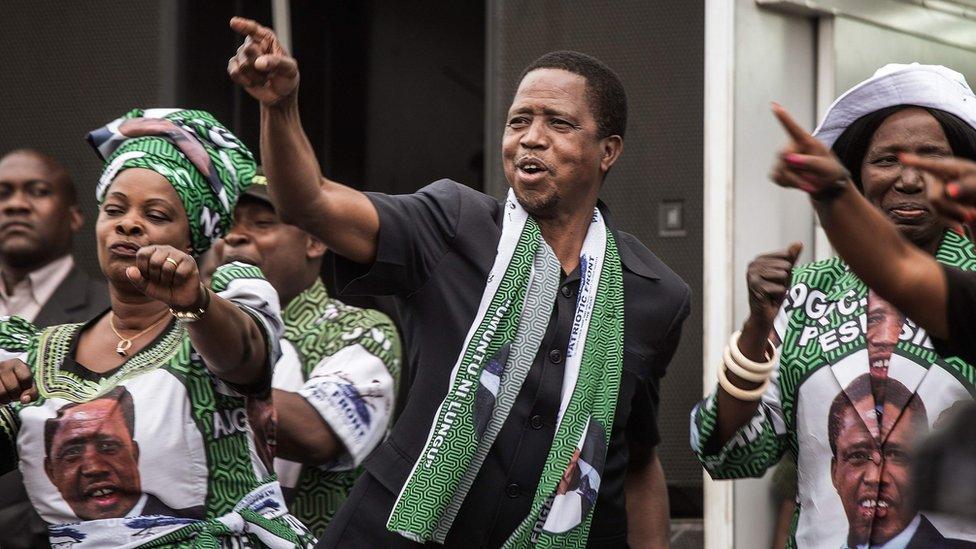
President Lungu (c) narrowly defeated Hakainde Hichilema in last year's election
Yet this is Zambia and what some feel is the abuse of the law is giving cause for concern.
Since the death of Presidents Levy Mwanawasa (2008) and Michael Sata (2014), Zambia has been through three presidential elections within the space of five years "so that has created a climate of uncertainty" explains Geoffrey Sakulanda, president of Zambia's Chamber of Commerce.
Now a protracted election dispute poses a grave distraction, just when Zambia is trying to get back onto an even footing after mounting public debt.
A diplomatically worded tweet from the British High Commissioner Fergus Cochrane-Dyet recently warned that investors were becoming "unnerved" by the on-going treason case. This was diplomatic-speak for calling on the leadership to get a grip.
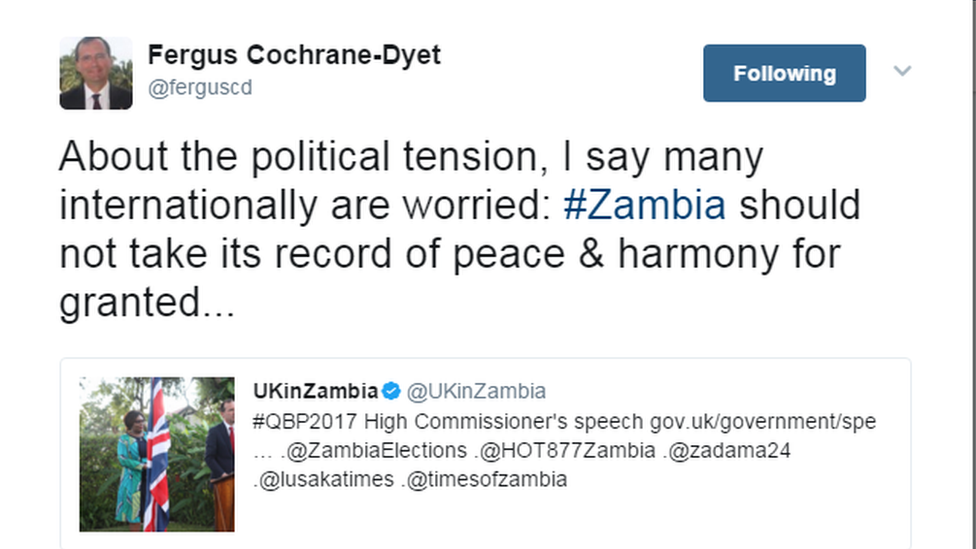
An IMF loan is in the pipeline to help get the economy back on track but lenders will want proof that Zambia's leadership is committed to democracy.
Given that the results of last year's closely fought election are being battled out in the courts and not on the streets is a sign of hope for Zambia's vibrant democracy.
After all, "the judiciary have proved in recent times that they are able to make independent decisions," says David Bweupe, news editor at local radio station Q FM.
But threats by President Lungu to impose a state of emergency - not yet realized - have brought back dark echoes of the past.

Who is Hakainde Hichilema?

The 54-year-old economist has contested nearly all elections in Zambia since 2006
A wealthy businessman, he has a solid track record in the private sector
Support base: Home region of Southern Province and is popular with younger voters
Known for being Zambia's second largest cattle rancher
Commonly referred to by his initials HH, he is married with three children

"We had it during Kenneth Kaunda's presidency, during the switch to multi-party politics but most Zambians are too young to understand what that would mean," Mr Bweupe says.
The church is also speaking out. In a strongly worded statement from the Conference of Catholic Bishops, it warned that Zambia was slipping towards a "dictatorship".
Amos Chanda, President Lungu's spokesman, has defended the court action, which he says must be left to run its course.
He insists the door is open for future talks with the UPND but Mr Hichilema's party must respect the president's authority first.
"They have accepted all the official benefits that go with the opposition in parliament but have not accepted who the president is."
In spite of this political nervousness, Zambia is still very much "open for business" insists Mark O' Donnell, a Zambia-born British businessman, who runs a company producing steel fixtures for the construction industry.
The country has "weathered the storm during neighbouring liberation struggles in the past," he says.
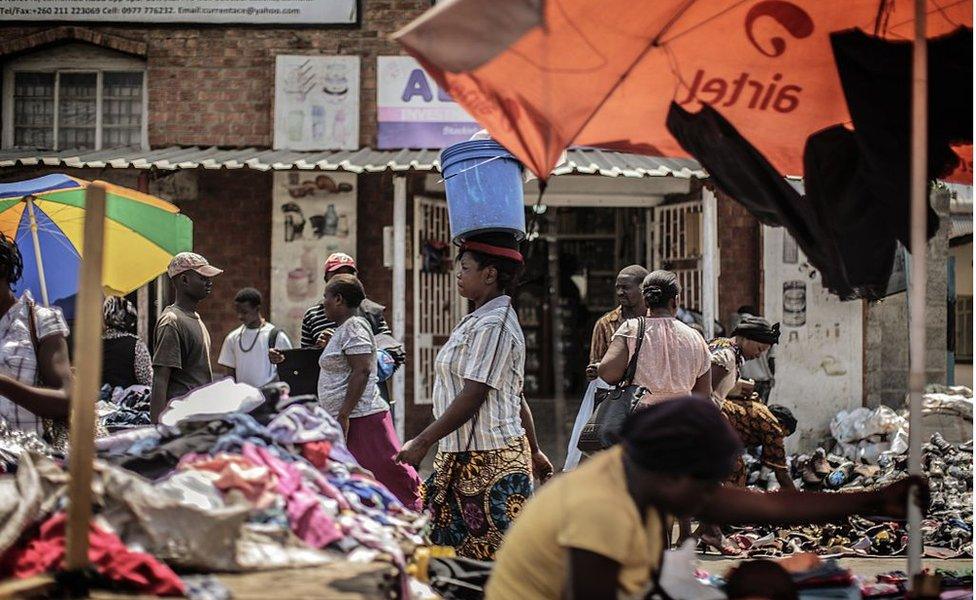
Zambia is still open for business
And if anything, investors are still knocking on the door because of the ease of doing business here - it is not Zimbabwe.
But that confidence has not trickled through to some stallholders at Soweto market, the largest of its kind in Zambia, where you can buy everything from fresh bread to fried caterpillar - a local delicacy.
Customers are staying away. One woman spoke of clashes every time the police come "hunting for opposition" figures here.
Another claimed she was "beaten up in front of her children and her stall trashed" when she complained about pro-government "thugs" extorting levies or "bribes".
Zambia may not yet have fallen from grace but it is clearly on notice as the court case marches on.
Yet "something tells me things are not right" warns Geoffrey Sakulunda.
- Published24 March 2023
